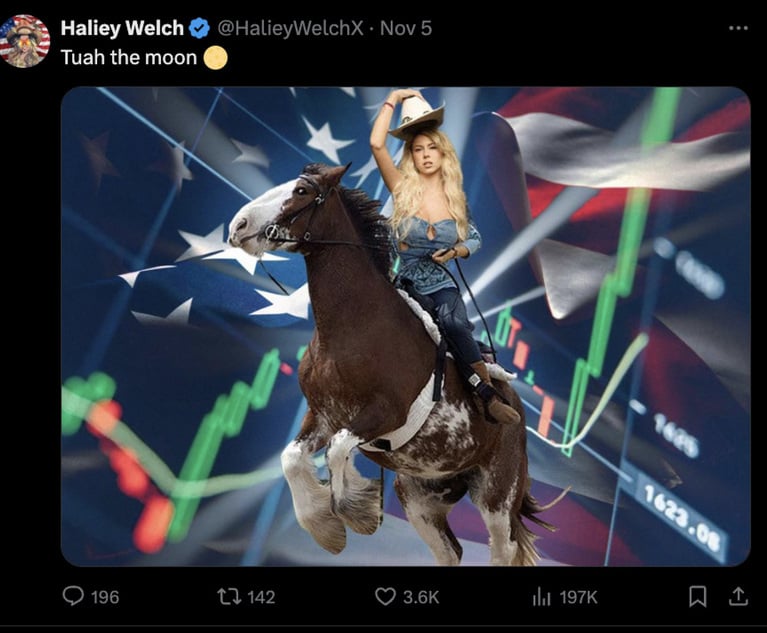 Entrance sign at the University of Florida, in Gainesville, Florida.
Entrance sign at the University of Florida, in Gainesville, Florida. Court Sides with UF in Campus Shutdown Case
The judge found that UF is shielded by sovereign immunity, a legal concept that generally protects government agencies from liability.
November 28, 2022 at 09:55 AM
3 minute read
 Entrance sign at the University of Florida, in Gainesville, Florida.
Entrance sign at the University of Florida, in Gainesville, Florida.
A divided appeals court Tuesday rejected a potential class-action lawsuit contending that the University of Florida should return fees to students because of a campus shutdown early in the COVID-19 pandemic.
The 2-1 decision by a panel of the 1st District Court of Appeal came as a similar case is pending at the Florida Supreme Court. The 2nd District Court of Appeal reached a different conclusion in that case, which was filed against the University of South Florida.
The decision Tuesday said an Alachua County circuit judge should have dismissed a lawsuit filed by University of Florida graduate student Anthony Rojas. The lawsuit sought refunds of fees paid for transportation, health-care and athletics services that were not provided because of the shutdown.
Rojas alleged that UF breached a contract when it did not provide the services. But in a seven-page majority opinion, Judge Rachel Nordby wrote that "assorted documents attached to the complaint do not constitute an express written contract."
As a result, she wrote that UF is shielded by sovereign immunity, a legal concept that generally protects government agencies from liability. Under sovereign immunity, agencies can face breach-of-contract lawsuits if it is shown that contracts have been violated.
"We are sympathetic to Rojas and all other students whose on-campus experiences were clipped short and rendered non-existent by the university's response to COVID-19," Nordby wrote in an opinion joined by Chief Judge Lori Rowe. "And if there were a sufficient contract attached to his complaint, we would affirm the trial court (decision not to dismiss the case) without hesitation. But without such an express, written agreement … sovereign immunity bars the action."
Judge Scott Makar dissented, pointing to a series of documents that Rojas' attorneys included in the case, such as what is known as a "financial liability agreement" and a statement of tuition and fees for the 2019-2020 academic year.
Makar wrote that the "explicit language of the financial liability agreement, by itself, characterizes the relationship between the university and its students as an 'agreement' that must be construed in accordance with Florida law."
"Little doubt exists that an enforceable written contract of some sort exists; if one did not, the university would have difficulty collecting tuition and fees for services because of the lack of mutuality," he wrote.
After the pandemic hit in 2020, campuses throughout Florida and the nation were shut down and students were forced to learn remotely. That has spawned lawsuits by students at numerous colleges and universities seeking refunds of money paid for services that became unavailable.
Tuesday's ruling came about a month after the University of South Florida went to the Supreme Court in a potential-class action lawsuit that alleges the university breached a contract with student ValerieMarie Moore. A panel of the 2nd District Court of Appeal this year upheld a Hillsborough County circuit judge's denial of a motion by the university to dismiss the case.
As another example of conflicting opinions about the issues, Florida's 3rd District Court of Appeal rejected a potential class-action lawsuit against Miami Dade College over fees collected from students.
On Tuesday, Nordby, Rowe and Makar urged the Supreme Court to wade into the issue. They took a step known as certifying a "question of great public importance" to the Supreme Court.
That question asked "whether sovereign immunity bars a breach of contract claim against a state university based on the university's failure to provide its students with access to on-campus services and facilities."
NOT FOR REPRINT
© 2024 ALM Global, LLC, All Rights Reserved. Request academic re-use from www.copyright.com. All other uses, submit a request to [email protected]. For more information visit Asset & Logo Licensing.
You Might Like
View All
Graffiti Showdown: Miami Clashes Over Demolition Site Cleanup Before New Year’s


Miami Beach Hotel Sues Celebrity Rabbi Shmuley Boteach, Asserts It Won’t Be ‘Extorted'
4 minute read
‘Hawk Tuah Girl’ $440 Million Meme Coin Collapse Sparks Legal Battle
4 minute readTrending Stories
- 1Decision of the Day: Judge Reduces $287M Jury Verdict Against Harley-Davidson in Wrongful Death Suit
- 2Kirkland to Covington: 2024's International Chart Toppers and Award Winners
- 3Decision of the Day: Judge Denies Summary Judgment Motions in Suit by Runner Injured in Brooklyn Bridge Park
- 4KISS, Profit Motive and Foreign Currency Contracts
- 512 Days of … Web Analytics
Who Got The Work
Michael G. Bongiorno, Andrew Scott Dulberg and Elizabeth E. Driscoll from Wilmer Cutler Pickering Hale and Dorr have stepped in to represent Symbotic Inc., an A.I.-enabled technology platform that focuses on increasing supply chain efficiency, and other defendants in a pending shareholder derivative lawsuit. The case, filed Oct. 2 in Massachusetts District Court by the Brown Law Firm on behalf of Stephen Austen, accuses certain officers and directors of misleading investors in regard to Symbotic's potential for margin growth by failing to disclose that the company was not equipped to timely deploy its systems or manage expenses through project delays. The case, assigned to U.S. District Judge Nathaniel M. Gorton, is 1:24-cv-12522, Austen v. Cohen et al.
Who Got The Work
Edmund Polubinski and Marie Killmond of Davis Polk & Wardwell have entered appearances for data platform software development company MongoDB and other defendants in a pending shareholder derivative lawsuit. The action, filed Oct. 7 in New York Southern District Court by the Brown Law Firm, accuses the company's directors and/or officers of falsely expressing confidence in the company’s restructuring of its sales incentive plan and downplaying the severity of decreases in its upfront commitments. The case is 1:24-cv-07594, Roy v. Ittycheria et al.
Who Got The Work
Amy O. Bruchs and Kurt F. Ellison of Michael Best & Friedrich have entered appearances for Epic Systems Corp. in a pending employment discrimination lawsuit. The suit was filed Sept. 7 in Wisconsin Western District Court by Levine Eisberner LLC and Siri & Glimstad on behalf of a project manager who claims that he was wrongfully terminated after applying for a religious exemption to the defendant's COVID-19 vaccine mandate. The case, assigned to U.S. Magistrate Judge Anita Marie Boor, is 3:24-cv-00630, Secker, Nathan v. Epic Systems Corporation.
Who Got The Work
David X. Sullivan, Thomas J. Finn and Gregory A. Hall from McCarter & English have entered appearances for Sunrun Installation Services in a pending civil rights lawsuit. The complaint was filed Sept. 4 in Connecticut District Court by attorney Robert M. Berke on behalf of former employee George Edward Steins, who was arrested and charged with employing an unregistered home improvement salesperson. The complaint alleges that had Sunrun informed the Connecticut Department of Consumer Protection that the plaintiff's employment had ended in 2017 and that he no longer held Sunrun's home improvement contractor license, he would not have been hit with charges, which were dismissed in May 2024. The case, assigned to U.S. District Judge Jeffrey A. Meyer, is 3:24-cv-01423, Steins v. Sunrun, Inc. et al.
Who Got The Work
Greenberg Traurig shareholder Joshua L. Raskin has entered an appearance for boohoo.com UK Ltd. in a pending patent infringement lawsuit. The suit, filed Sept. 3 in Texas Eastern District Court by Rozier Hardt McDonough on behalf of Alto Dynamics, asserts five patents related to an online shopping platform. The case, assigned to U.S. District Judge Rodney Gilstrap, is 2:24-cv-00719, Alto Dynamics, LLC v. boohoo.com UK Limited.
Featured Firms
Law Offices of Gary Martin Hays & Associates, P.C.
(470) 294-1674
Law Offices of Mark E. Salomone
(857) 444-6468
Smith & Hassler
(713) 739-1250






